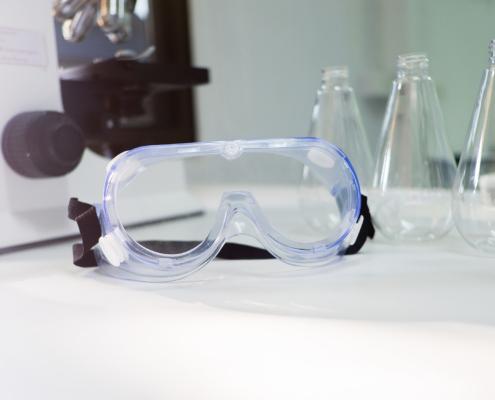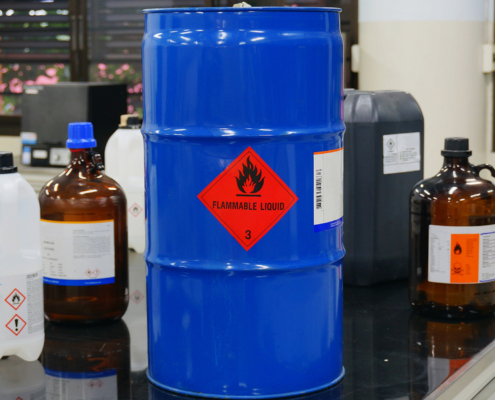
Highly Hazardous Chemicals and How To Handle Them Safely
Chemicals are everywhere. They literally make up our entire world. However, some chemicals and compounds can be dangerous to humans. These substances require special care and handling to prevent causing injury, illness, or damage to equipment. Keep reading to learn more about highly hazardous chemicals and how you can handle them safely.
The Importance of Proper Chemical Handling
Proper chemical handling, storage, and transportation are essential whether you’re working in a commercial, industrial, agricultural, or medical setting. Improper chemical storage can result in chemical leakage or spills, damaging facility equipment and creating hazards for employees. In addition, prolonged exposure to chemicals and some hazardous substances can result in long-term negative health effects, such as skin conditions and disorders of the lungs, kidneys, and liver. As such, you must use proper personal protective equipment (PPE) and handling precautions to prevent long-term damage.
Essential Equipment and Safety Attire
When handling highly hazardous chemicals, you need to use the proper personal protective equipment to prevent toxic substances from affecting your respiratory system, skin, or eyes. Here are some of the most effective pieces of equipment that can reduce the risk of exposure to chemicals:
- Goggles – Goggles protect your eyes from chemical splashes and exposure to vapors. They should be worn when handling any highly hazardous chemical.
- Gloves – Safety gloves protect your hands from toxics and reactives. There are many different types of protective gloves, so make sure you use the appropriate type of glove for specific chemicals.
- Respiratory protection – Some highly hazardous chemicals release harmful vapors that, when inhaled, can result in long-term health effects. When working with these chemicals, consider wearing devices like masks or respirators to filter out hazardous fumes.
- Lab coat or other full-body cover – Lab coats and coveralls can protect you from highly hazardous chemical leaks and spills. These pieces of equipment allow you to handle chemicals safely without fear of long-term damage from exposure.
At Axiom Products, we understand that different industries require different safety precautions. That’s why we provide products tailored to individual industries, whether that be industrial, medical, or agricultural.
Toxic Chemicals, Their Effects, and How To Handle Them
To perform proper chemical handling, you need to know which chemicals are commonly used in various industries and how to prevent adverse effects.
Lead
Lead is one of the most common elements found in the environment. However, prolonged exposure can negatively affect children’s IQs and pregnant women while decreasing kidney and reproductive functions for the general populace.
Lead exposure is less common now than it used to be; however, industrial sites, such as former lead smelters, may continue to emit lead into the environment. You can lower your chances of lead exposure by performing diligent cleaning and by flushing out water sources.
Mercury
Like lead, mercury exposure is less common than it used to be. It used to be a common chemical used in medical offices, but with recent data showing its adverse effects, it is no longer used in medical equipment like thermometers and dental amalgams.
However, some of these medical devices are still in use, and breaking them can release toxic mercury vapors into the air. It is also sometimes used in gold mining, where it is heated up and vaporized. When cleaning up mercury or working with it industrially, you must wear respiratory protection. Exposure to both methylmercury and industrial mercury can cause adverse neurological effects, such as “pins and needles” sensations, headaches, or mood swings.
Formaldehyde
Formaldehyde is commonly found in building materials, insulation, fertilizers, and pesticides. It is also used as a preservative in some medicines, fabric softeners, and dishwashing detergents. If you work with any of these substances, you should be aware of the long-term effects of formaldehyde.
Formaldehyde irritates the skin, eyes, and respiratory tract, and high levels of exposure may cause certain types of cancer. The primary way that people are exposed to this substance is by breathing in small amounts that these products have released. When working with formaldehyde, be sure to wear proper respiratory protection, goggles, and gloves.
Air Pollutants
There are nearly 200 toxic air pollutants that can negatively affect your health. Some of the most common are benzenes, perchloroethylene, and methylene chloride. Benzene is found in gasoline, perchloroethylene is emitted from some dry cleaning processes, and methylene chloride is used as a solvent and paint stripper in industrial processes.
As the name implies, these air pollutants are found in the air. When working in industrial applications, plan to wear a face mask or respiratory device to prevent inhalation. Exposure to air pollutants can cause neurological, reproductive, developmental, respiratory, and immune system problems.
Asbestos
Asbestos is another highly hazardous chemical that has historically been used in construction and industrial applications. People are commonly exposed to asbestos during home maintenance, repair, and demolition. Asbestos exposure can increase your risk of developing lung cancer, mesothelioma, and asbestosis, so it’s essential that you wear a respirator, gloves, and goggles while handling it.
Pesticides
Pesticides are used in agriculture to prevent pests from damaging crops. Although they are instrumental in this regard, they can be dangerous if not handled or stored correctly. The effects of pesticides depend on which type is used—some affect the nervous system, some are carcinogenic, and others can damage the eyes and respiratory tract. To prevent these adverse effects, wear coveralls, gloves, and goggles and wash your hands thoroughly after handling pesticides. Ensure these chemicals are stored away from water sources, as ingestion can also cause negative effects.
Axiom Helps You Handle It All
No matter what industry you work in, you must have the proper personal protective equipment accessible to protect yourself from highly hazardous chemicals. Axiom Products provides superior safety equipment, such as goggles, gloves, and chemical jug rinsers that help you stay safe and avoid contact with potentially hazardous materials.
Contact us today to learn more about chemical handling safety and see how we can help make your chemical processes safer.





